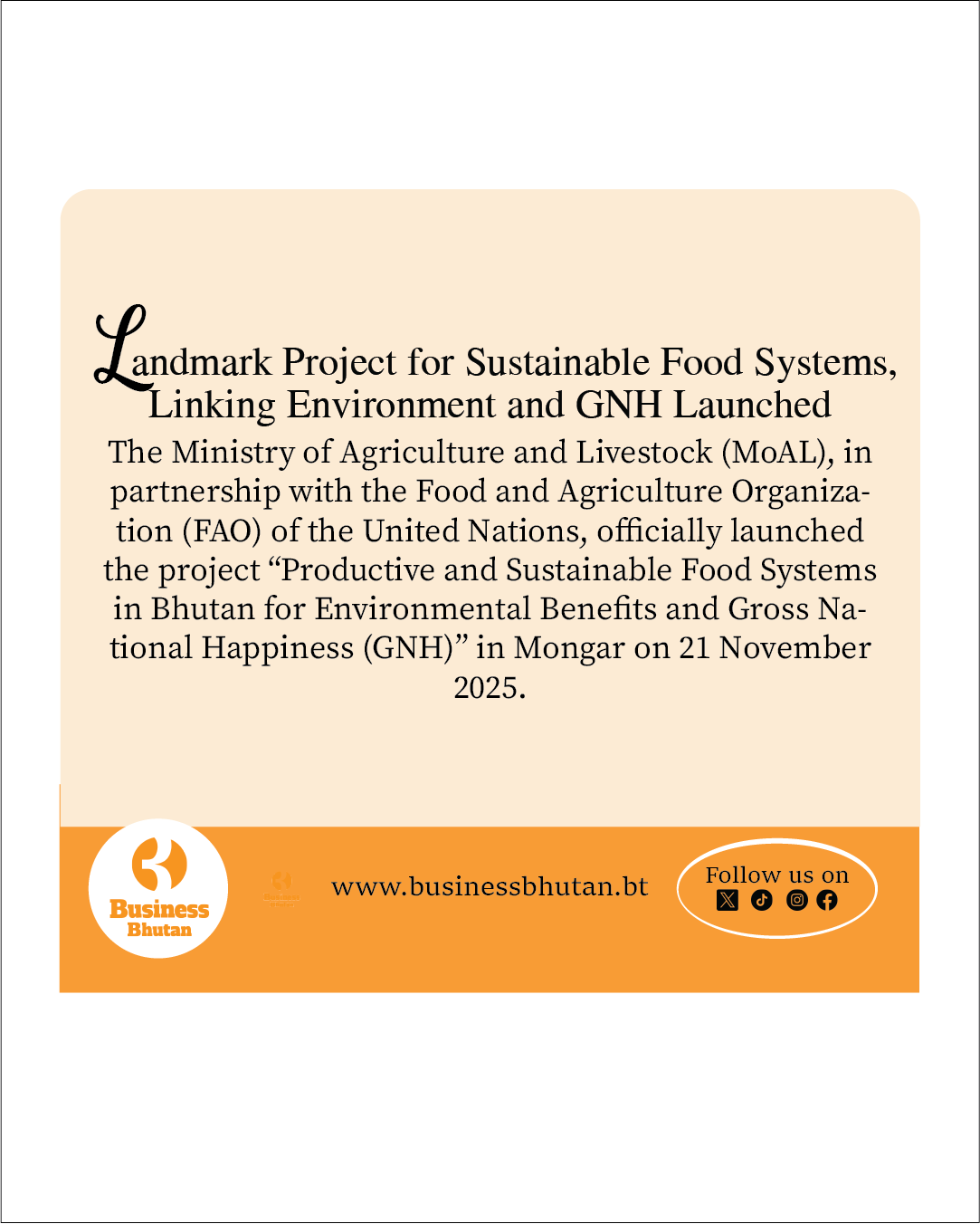In a significant move to strengthen Bhutan’s agricultural sector, the Royal Government of Bhutan (RGoB) is set to overhaul the cooperative and farmer group framework through the proposed Bhutan Cooperatives and Farmer Groups Bill 2025.
During the 19th Meet The Press (MTP) on 29 August 2025, the Minister of Agriculture and Livestock, Younten Phuntsho, highlighted that the reform aims to streamline governance, improve operational efficiency, and ensure the long-term sustainability of cooperatives and farmer groups across the country.
As of 2025, Bhutan hosts over 700 farmer groups and 120 cooperatives, which play a pivotal role in promoting agricultural commercialization and rural enterprise development. Recognizing their central role, the government has prioritized reforms to create a more responsive and robust cooperative ecosystem.
Currently, cooperatives operate under the Cooperatives (Amendment) Act of 2009. However, in light of evolving economic and social needs, the new bill has been submitted to Parliament and has already undergone two readings in the third session of the Fourth Parliament, signaling strong legislative support for a revitalized sector.
One of the bill’s central features is the establishment of distinct legal frameworks for cooperatives and farmer groups, acknowledging their unique roles and operational models. This differentiation allows for tailored governance and management practices suited to each type of organization.
The bill also proposes delegating registration authority to regional field offices, streamlining administrative processes and reducing bureaucratic delays. This move is expected to make formalization easier for new groups, encouraging broader participation in the cooperative sector.
To address compliance costs and enhance financial transparency, a tiered auditing system will be introduced. Smaller groups will conduct internal audits, while larger federations will undergo audits by certified auditors. This approach balances accountability with cost-efficiency, ensuring that smaller entities are not overburdened.
Dispute resolution is another critical component. The bill proposes the establishment of regional dispute resolution committees, providing accessible forums for resolving conflicts locally. This decentralized approach aims to reduce legal bottlenecks and strengthen trust and cooperation among stakeholders.
Additionally, the bill empowers advisory committees representing ministries, civil society, and other sectors. These committees will provide strategic guidance, promote cross-sector collaboration, and ensure that cooperatives and farmer groups align with national development objectives.
The government’s dedication to revitalizing the cooperative sector is reflected in the allocation of Nu. 910.5 million under the 13th Five Year Plan, earmarked for agricultural marketing and cooperative development.
“This substantial investment underscores our focus on capacity building, infrastructure development, and market linkages,” said the Minister. The Department of Agricultural Marketing and Cooperatives (DAMC), under the Ministry of Agriculture and Livestock, will lead these initiatives, equipping cooperatives with the skills, infrastructure, and networks necessary to thrive.
In the 2025–2026 financial year, the government plans to directly support at least 10 cooperatives, guiding them toward commercial viability. Assistance will cover business management, governance, market access, and other critical areas, aiming to foster a vibrant cooperative ecosystem that enhances rural incomes, food security, and export potential.
The reform also emphasizes youth participation in agriculture through youth groups and cooperatives. The government is focusing on supplying vegetables, fruits, and livestock products to institutions such as Gyalsung Academies, Gelephu Mindfulness City, and export markets.
These initiatives aim to establish sustainable supply chains, providing young farmers with opportunities for enterprise development. Stronger institutional linkages are being developed to ensure a consistent and reliable supply of agri-food products to schools, monasteries, hospitals, and other national institutions.
Sherab Dorji
From Thimphu
In a significant move to strengthen Bhutan’s agricultural sector, the Royal Government of Bhutan (RGoB) is set to overhaul the cooperative and farmer group framework through the proposed Bhutan Cooperatives and Farmer Groups Bill 2025.
During the 19th Meet The Press (MTP) on 29 August 2025, the Minister of Agriculture and Livestock, Younten Phuntsho, highlighted that the reform aims to streamline governance, improve operational efficiency, and ensure the long-term sustainability of cooperatives and farmer groups across the country.
As of 2025, Bhutan hosts over 700 farmer groups and 120 cooperatives, which play a pivotal role in promoting agricultural commercialization and rural enterprise development. Recognizing their central role, the government has prioritized reforms to create a more responsive and robust cooperative ecosystem.
Currently, cooperatives operate under the Cooperatives (Amendment) Act of 2009. However, in light of evolving economic and social needs, the new bill has been submitted to Parliament and has already undergone two readings in the third session of the Fourth Parliament, signaling strong legislative support for a revitalized sector.
One of the bill’s central features is the establishment of distinct legal frameworks for cooperatives and farmer groups, acknowledging their unique roles and operational models. This differentiation allows for tailored governance and management practices suited to each type of organization.
The bill also proposes delegating registration authority to regional field offices, streamlining administrative processes and reducing bureaucratic delays. This move is expected to make formalization easier for new groups, encouraging broader participation in the cooperative sector.
To address compliance costs and enhance financial transparency, a tiered auditing system will be introduced. Smaller groups will conduct internal audits, while larger federations will undergo audits by certified auditors. This approach balances accountability with cost-efficiency, ensuring that smaller entities are not overburdened.
Dispute resolution is another critical component. The bill proposes the establishment of regional dispute resolution committees, providing accessible forums for resolving conflicts locally. This decentralized approach aims to reduce legal bottlenecks and strengthen trust and cooperation among stakeholders.
Additionally, the bill empowers advisory committees representing ministries, civil society, and other sectors. These committees will provide strategic guidance, promote cross-sector collaboration, and ensure that cooperatives and farmer groups align with national development objectives.
The government’s dedication to revitalizing the cooperative sector is reflected in the allocation of Nu. 910.5 million under the 13th Five Year Plan, earmarked for agricultural marketing and cooperative development.
“This substantial investment underscores our focus on capacity building, infrastructure development, and market linkages,” said the Minister. The Department of Agricultural Marketing and Cooperatives (DAMC), under the Ministry of Agriculture and Livestock, will lead these initiatives, equipping cooperatives with the skills, infrastructure, and networks necessary to thrive.
In the 2025–2026 financial year, the government plans to directly support at least 10 cooperatives, guiding them toward commercial viability. Assistance will cover business management, governance, market access, and other critical areas, aiming to foster a vibrant cooperative ecosystem that enhances rural incomes, food security, and export potential.
The reform also emphasizes youth participation in agriculture through youth groups and cooperatives. The government is focusing on supplying vegetables, fruits, and livestock products to institutions such as Gyalsung Academies, Gelephu Mindfulness City, and export markets.
These initiatives aim to establish sustainable supply chains, providing young farmers with opportunities for enterprise development. Stronger institutional linkages are being developed to ensure a consistent and reliable supply of agri-food products to schools, monasteries, hospitals, and other national institutions.
Sherab Dorji from Thimphu




![Fresh Beginnings: Pasakha Vendors Gear Up for New Vegetable Market - Duplicate - [#16963] Fresh Beginnings: Pasakha Vendors Gear Up for New Vegetable Market - Duplicate - [#16963]](https://businessbhutan.bt/wp-content/uploads/2025/11/Asset-200.png)











